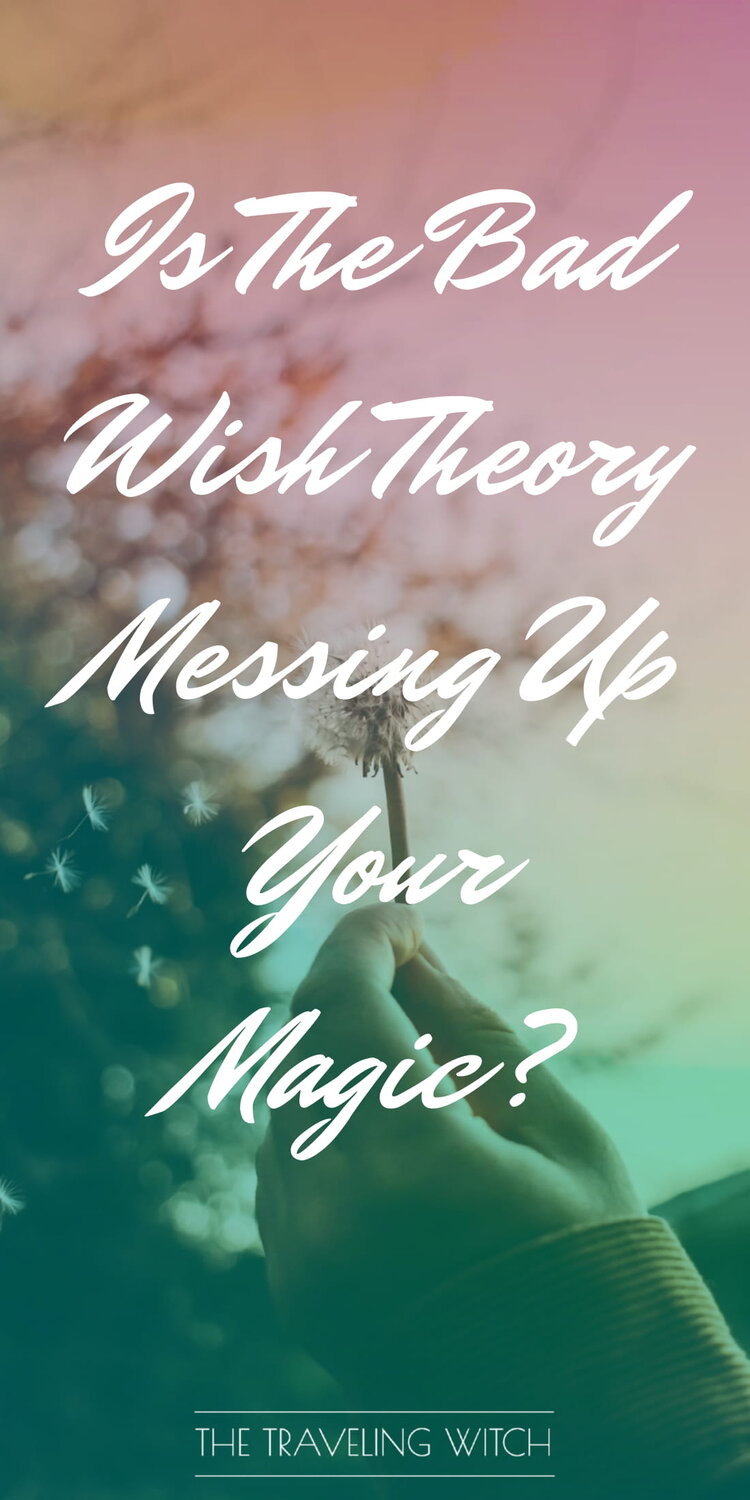I’m fairly certain that just about everyone in the Western world has heard the adage “be careful what you wish for.” While cliche, this saying does have some wisdom for those of us who work magic. We all know how the story goes. Our protagonist makes a wish, whether by genie or wishing well or some other magical means, but doesn’t word the wish specifically and so is left with an undesirable and potentially quite hazardous result. We have dozens of iterations of this story spanning centuries and many cultures in their origins.

This certainly isn’t a coincidence. Magical thinking may no longer be the predominant and assumed viewpoint of the greater populace, but at one point, magic was a core part of how people interacted with their world. It was well known that magic was not an easy or harmless solution. Magic was treated with respect, yes, but also with a measure of healthy distrust. We knew that magic could harm just as easily as it could help.
This understanding of magic is something that we should familiarize ourselves with as witches. We are engaging with the magical forces of our world and like many of the natural forces that exist in our world, it can be both life-giving and disaster creating. Water, for example, is absolutely necessary for life on our planet. It is also capable of becoming a hurricane or a tsunami and demolishing entire cities in a day. Magic is much the same and when harnessing a force of this nature, it is necessary to work with it respectfully and with a deep understanding of its true complexity.
The Pitfalls Of Not Being Specific
Okay, but does magic really work like some folktale from hundreds of years ago? Are these superstitions even worth listening to? While we may not want to treat these kinds of stories as the gospel truth, very often folklore is built around a seed of truth. These stories are created to teach lessons about the world that we live in and while it likely wasn’t expected that they would be taken literally, they do contain wisdom that can be applied in our own lives.
In this case, not being specific in your magic can have very serious consequences. For example, if you work a weight loss spell but do not specify how you would like to lose the weight, it is entirely possible, even probable, that your spell will result in something like food poisoning that prevents you from eating for a week. This would absolutely achieve your goal of losing weight but I don’t think many people would choose food poisoning as their preferred way to achieve results.
As another example, say you work a spell to bring more money and abundance into your life. If you do not specify the quantity of money that you desire or the means by which you would like to receive that money you might simply begin finding pennies and nickels on the ground everywhere you go. This amount of money isn’t likely to make much of a difference in your life, but it would satisfy the specifications for the spell. You did in fact receive more money.
This kind of vague spell casting can lead to truly horrific results. Remember, magic works through the path of least resistance. When left without boundaries it will find the easiest way to achieve whatever it is you desire. Sometimes that method will result in exactly what you want, sometimes the path of least resistance is fine. In other situations, however, the path of least resistance is a wholly undesirable outcome. I’m talking about things like casting a spell to get someone out of your life that results in them being run over by a truck, casting a spell to bring travel into your life and getting evicted, or casting a spell to keep a partner close to you and having them break their leg and have to stay home for 6 weeks. None of these outcomes are what we have in mind when we work these kinds of spells!
Pros & Cons Of Specificity
In other situations, specificity is not always desirable. When a spell is unlikely to cause unintended harm or is particularly urgent or necessary, then specificity can act in a way that constricts your magic and prevents you from getting good results. This is why we don’t take folklore at face value. These stories are meant to encourage the audience to think and to give warnings about potential dangers. What differentiates a good wish from a bad wish? How do you frame what you want in such a way that brings you the desired result without hurting other people?
If you’re casting a love spell then specificity can be a very bad thing. If you cast a love spell designed to force a specific person to love you, then that spell could very easily backfire on you. Aside from the fact that starting a relationship in this kind of coercive manner is likely to lead to a very unhealthy relationship overall, this kind of spell can easily have unintended consequences through its specificity. By limiting the spell to a single person, you are discounting the millions of other people that could potentially give you a much happier relationship far more willingly. You can, in essence, trap yourself in a relationship with someone who doesn’t truly love you and cannot provide you with the type of partnership that you want and deserve. Yes, maybe you did get the relationship with the person that you wanted! That does not mean that you got the relationship that you wanted.
In instances where this kind of specificity can encroach upon another person’s free will, it’s best to leave your spells more broad and vague in their intentions. Rather than casting a spell to make one person love you, you can cast a spell to draw your ideal relationship into your life. If the spell does not draw the person you initially had in mind that means they would never have given you the relationship you desired in the first place. You dodged a bullet!
It’s also not a good idea to be too specific in situations where there is urgency or great need. You don’t want to cast a spell to get one specific job when you are currently unemployed and desperate for money. You are much better off casting a general job spell to attract a particular type of job and taking something that meets your immediate needs so that you have the time to focus on a more specific spell.
This can also apply in situations that involve more danger. If you are being threatened, abused, or harassed and cast a banishing spell to remove this person from your life and they get run over by a truck, that may not always be such a bad thing. True, it wasn’t what you originally intended, however, it does make you 100% safe in a way that you might not otherwise get. It may also protect other people. I’m not saying that we should go around casting death spells on anyone who scares us. The moral and ethical ramifications of cursing is not today’s topic. All I’m saying is that in truly dire situations even the less desirable means of achieving a result may still be preferable to no result at all.
Walking The Line Between Too Specific & Not Specific Enough
So how do we walk the line between casting spells that are too specific or not specific enough? There are a few criteria that you can use to judge how specific you should make your spells.
1. Will this encroach on free will?
The first thing to consider is whether a spell will encroach on another person’s free will or not. if it does, this does not automatically mean that you should not cast the spell in that way. In some cases, overriding someone else’s free will is still necessary for your desired outcome. For example, casting a spell to get a particular job can be seen as overriding the free will of the interviewer and the hiring manager. Binding spells are also a form of spell work that overrides the free will of the person it is being cast on. That does not make binding spells any less necessary in many situations! This isn’t likely to cause harm to them or to you and is therefore up to your personal comfort level with this kind of spell work.
In other cases, overriding free will is a recipe for disaster. As in our previous example of the love spell, trapping someone in a relationship that they would not have chosen themselves can have many unintended consequences such as not getting the relationship you envisioned, creating a sense of underlying resentment and anger within the relationship, and putting the target of the spell in a magical trap that will eventually fail, leading to the failure of the relationship, very likely in a spectacular and explosive manner.
2. How much energy will the spell require?
Your next consideration should be how much energy the spell will require to achieve your desired results. In many cases, a less specific spell will require less momentum in order to function. As mentioned, magic will always take the path of least resistance. This means that sometimes you can achieve the results you desire with very little effort. If there is an easy solution to your problem, then your magic will not need to expend a significant amount of effort to produce results.
Magic is not always this easy though. Sometimes the desired result must come through a very particular avenue and if this path to success is not a simple one, then the energy necessary to achieve results can be far higher. In cases where you really do need the specificity to achieve your desired results, then this trade-off becomes necessary. You can expect to put far more energy into these kinds of spells. That said, if the spell could take many avenues to your desired result then adding that specificity could simply make a spell more taxing that it really needs to be.
If you can safely make a spell less specific while still achieving good results then that is generally the less taxing way to perform your spellwork. If you cannot, then it’s best to make a spell specific and find ways to supplement the power that you will need to achieve results.
3. Are there ways that this spell could manifest that would be dangerous or undesirable?
Look at the intention that you have set for this spell. Try to come up with as many ways that this spell could go horribly wrong as you can think of. Some of the things you come up with will definitely not be the path of least resistance. You can eliminate these things entirely. The likelihood of your spell going out of its way and expending unnecessary effort to create a bad result is infinitesimal. If you can think of ways that the spell could follow the letter of your intention but not the spirit of your intention while reducing the amount of energy and effort required, you should assume that it will do so and adjust your intention to negate that possibility.
4. Am I leaving too much ambiguity to such a degree that I could get something very different from what I want?
Finally, think of all the ways that your spell could short change you or give you something very different from what you desire. Take, for instance, the money spell we discussed earlier. By simply asking for more money and not specifying how much or where it should come from you may get completely inconsequential amounts of money from entirely random sources. This is not necessarily a dangerous outcome, but it’s not a desirable outcome either. You’re not actually getting what you want! If you can think of ways that your spell would short change you like this then you should add more specificity to your intentions.
Keep in mind that you don’t need to scrutinize every single spell you do in this way. This process is best used when the material world and other people are involved. When in doubt you can run through the above process very quickly to determine whether a spell needs a more in-depth analysis before being cast. If you ask yourself the above questions and the answers you come up with leave you with no concern, then you can probably move forward with the spell without too much worry.
Over time this process will become more innate and automatic and require far less effort on your part. You will develop a sense of how magic functions and responds to both specificity and a lack of specificity and be able to understand what is necessary without much thought. In the meantime, don’t feel like you have to overthink every single magical action that you take! Not every spell is primed for disaster. In fact, most of them aren’t! Frequently, the path of least resistance is very mundane and not at all harmful. This process is simply designed to give you peace of mind, use it as necessary but don’t allow this knowledge to prevent you from working spells. Magic is a way to take back power in your life and the more knowledge you have the more power you can reclaim.
New to witchcraft?
Sign up for my FREE Witchcraft class!



Such a helpful post. I’m always struggling to walk the fine line being being too specific and not specific enough. This advice makes life much easier. Thank you!